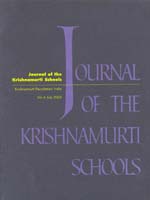Issue 6 - July 2002

- Written by J. Krishnamurti
How can the mind know if it has found what it calls the ultimate, the immeasurable, the nameless, the most sublime?
- Written by Alok Mathur
This journal is now six years and six issues old. Started as an in-house publication of the Krishnamurti schools, it has begun to reach out to a wider readership: to parents, teachers, educational administrators and other individuals or institutions interested in the educational issues of our times.
- Written by P. Krishna
The spectacular events of terrorism that took place in the United States a few months ago have focussed the attention of the whole world on the issue of global violence.
- Written by Usha Raman
We live our lives in compartments. The big one for this, the smaller one for that, and the mid-sized one for something else.
- Written by Patrick Foster
In the 1950s and '60s, the secular, objective, 'scientific' study of religion broke away from the traditional discipline of religion (i.e., apologetics for a particular dominant religion).
- Written by Geeta Varadan
In every human being there is the quest for the unknown, and in every consciousness, whether young or old, whether traditional or modern, there is a notion of God.
- Written by Toon Zweers
It's a winter afternoon, and the sun shines red through the trees as I walk through the woods.
- Written by Vinita Kaushik Kapur
I start with Krishnamurti's statement: ...reality cannot come into being...without self-knowledge, self-knowledge which is discovered from moment to moment in the mirror of relationship, so that all illusion is stripped away, so that the ego does not build fantasies, escapes.
- Written by Amir Huda
I feel that learning in general, including in schools, is the incremental acquisition of knowledge or information in time, which by its very nature may thwart the process of discovery, by establishing in the mind a framework or paradigm of how to deal with the unknown.
- Written by Kamala V. Mukunda
One of Amir Huda's central points is that, throughout our education, we have become used to learning from teachers in a step by step, accumulative process, instead of discovering things on our own.
- Written by P. Ramesh
In recent conversations with friends where we were trying to understand each other as well as to enquire into deep questions of life, a frequent impediment would be the different meanings or connotations we ascribe to the words we use.
- Written by Suchitra Ramkumar
Erik Erikson was a psychologist who did most of his work in the post-Freudian era, in the 1930s to the 1950s.
- Written by Shailesh Shirali
Competition as a driving principle of life seems to have become all-pervasive, and it appears to extend into every nook and cranny of social activity: sports, music, dance (and all the performing arts), business, research, academia in general.
- Written by Shama Husain
Surely a school is a place where one learns about the totality, the wholeness of life.
- Written by Tarit Bhattacharjee
An aesthetic approach towards life and environment is inherent to human existence.
- Written by Harshad Parekh
During the holidays, I get long stretches of time to read the newspapers, magazines and to watch television.
- Written by Bela Raja
What are 'Learning Difficulties'? Today, a large number of schools and institutions across India are sensitive to the fact that 15 percent of all school-going children have some degree of learning difficulties.
- Written by Yasmin Jayathirtha
When five science teachers get together to discuss what science teaching (or learning) should be across the school, it makes for a rambling, shapeless and extended discussion over many months.
- Written by Bill Taylor
As society and the technology that drives it become ever more complex, our children are force-fed increasing mounds of knowledge that are intended to prepare them for adult life and the demands of the workplace.
- Written by Caroline Ritchie
It was almost a year ago that my husband Julian and I decided that it was time for us to take a career break, to reflect on where we were in our lives, to leave the treadmill of work and commuting in South England, and to gain some experience of another culture.
- Written by Jayashree Nambiar and Alok Mathur
There is an urgent concern among educators about the pervasive role that the media plays in all our lives today.
- Written by Jayashree Nambiar and Alok Mathur
We live in a media-dominated society.
- Written by Jayashree Nambiar and Alok Mathur
As education concerns itself with an understanding of the world and ourselves, it must necessarily also grapple with the sources of influence and representations of reality thatwe are constantly exposed to.
- Written by Jayashree Nambiar and Alok Mathur
Objective: Creating a critical awareness of various aspects of television news.
- Written by Jayashree Nambiar and Alok Mathur
Objective: a) To sensitise young readers, boys and girls, to the potent imagery in the magazine and become aware of its influences.
- Written by Jayashree Nambiar and Alok Mathur
Objective: To help students analyse a set of advertisements and understand their responses to them.
- Written by K. Ramesh
At the outset, I would like to explore the meaning of the word 'communion', which Krishnamurti often used in his writing.
- Written by S. Rangaswami
The relationship between humans and birds goes back to the earliest times.
- Written by Jayant Tengshe
It was May 1988. At around 8:00 p.m. on a humid, crowded platform of Dadar Railway Station in Mumbai, I was waiting with a bunch of excited, chattering boys and girls.
- Written by Arvind Ranganathan
Teachers choose their vocation for a number of reasons: love of a subject, a desire to share one’s passion with others, care for young children, interest in understanding the human mind, or to have a say in shaping the next generation.

